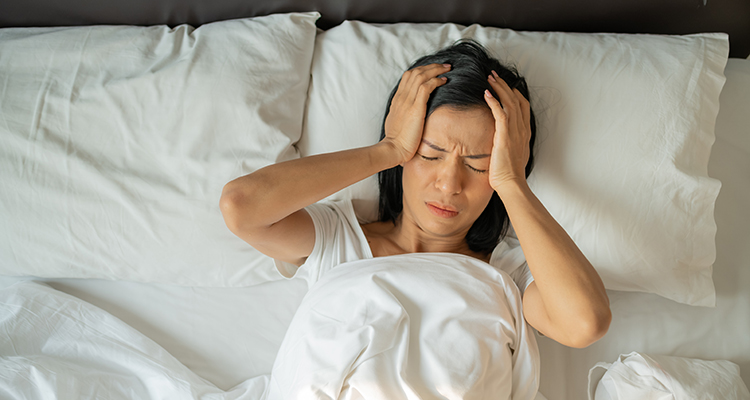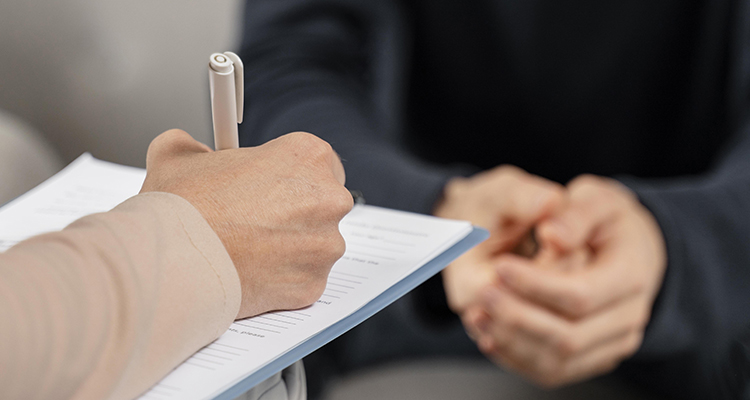Sleep Doctors – What They Do & When to See One
Primary care doctors are some of the most common and widely used. These healthcare professionals can address a variety of ailments, illnesses, and complaints. While it’s in your best interest to routinely see a primary care physician for check-ups, some conditions require the help of a specialist.

As the name suggests, these doctors specialize in specific illnesses and conditions including things like cancer, allergies, and even pregnancy. Specialists are educated and trained in a specific area, while primary doctors provide a general assessment of your health and wellbeing.
One such area of expertise for a specialist is sleep. With 1 in 3 adults not getting the recommended amount of sleep each night, sleep doctors are in high demand. But what exactly do they do and how do you know if your sleep problems warrant a doctor’s visit? Keep reading to discover the answers to these questions and more.
Content
What is a Sleep Doctor?
Sleep doctors often referred to as sleep specialists, are doctors who diagnose and treat sleep disorders. Many sleep specialists share the same backgrounds in neurology, psychiatry, internal and medicine. These doctors are required to complete a sleep medicine program or fellowship before they can practice and become board certified by the American Board of Sleep Medicine.

Sleep psychologists are another common type of sleep doctor but differ slightly from sleep specialists. These experts focus on mental and behavioral triggers and underlying issues that could be causing a person’s sleep issues. CBT-i (cognitive behavioral therapy for insomnia) is a common technique used by sleep psychologists to replace negative patterns of behavior and thinking with healthier, more productive ones.
Common Types of Sleep Doctors
Several different specialists fall under the umbrella term “sleep doctor”. And each one specializes in a specific type of sleep issue or age group. Here are some of the most common.

- Neurologist (treat brain and nervous system disorders)
- Psychiatrists and psychologists (treat the thoughts and behaviors that contribute to lack of sleep or poor sleep quality)
- Otorhinolaryngolosits (also known as ear, throat, and nose specialists or ENT and treat sleep disorders associated with snoring like sleep apnea)
- Oral and maxillofacial surgeons (correct problems with the jaw or mouth that could be causing sleep disturbances)
- Respiratory specialists (sometimes work with sleep doctors to help address breathing disorders that may worsen an existing sleep condition)
- Pediatricians (work with children suffering from certain sleep disorders)
As you can see, even within the world of sleep doctors there are specialists trained to address individual sleep disorders and their associated symptoms. Some of the most commonly diagnosed disorders include:
- Insomnia
- Sleep apnea
- Sleepwalking (parasomnias)
- RLS (restless leg syndrome)
A proper diagnosis is important since many sleep disorders can have serious, long-term impacts on your overall health and wellbeing. Sleep disorders often impact all aspects of your life including both your mental and physical health.
Signs You Need to See a Sleep Doctor
All too often people brush off sleep disorder symptoms as no big deal. Left untreated, these disorders can lead to serious health risks and complications. Knowing the warning signs of these common sleep disorders is step one in getting the treatment you need and finding the right sleep doctor for the job.
Here are some common signs that those sleepless nights may be more serious than you think and that it’s time to seek help.

Struggling to Fall and Stay Asleep
Insomnia is the most common sleep disorder and is defined as difficulty falling and staying asleep. If you find yourself tossing and turning at night, staring at the ceiling, or waking up frequently throughout the night, you may be suffering from insomnia. On average, it should only take you between 5 and 20 minutes to fall asleep. Anything longer may be an indication that something’s wrong.
A sleep doctor may suggest you keep a sleep diary of what time you go to bed, how long it takes you to fall asleep, how many times you wake up, and how long you’re awake. By examining these facts, a specialist can recognize unhealthy patterns of behavior or identify triggers for your sleep issues.
Experiencing Excessive Daytime Sleepiness
Experiencing daytime fatigue even after sleeping all night could be a sign that you’re not getting the quality sleep you think you are. Even if you’re in bed for eight hours or more and don’t remember waking up, excessive sleepiness during the day indicates a restless night’s sleep.
This is also a common side effect of sleep apnea, where individuals snore or gasp for air during the night, interrupting their natural sleep patterns. The worst part is, that you may not even realize it’s happening. Most often, it’s a partner or roommate that notices these symptoms first before alerting their housemate.
Snoring or Gasping for Air During Sleep
These are two more common signs of obstructive sleep apnea (OSA) that need immediate attention. Sleep apnea is one of the most dangerous sleep disorders since a person’s breathing starts and stops periodically throughout the night. This deprives your brain, lungs, and other organs of much-needed oxygen and blood circulation.
OSA occurs when the muscles in your throat, tongue, and other soft tissues relax during sleep and obstruct the airway. This sleep disorder is most common among men and those who are elderly or overweight. Treatment includes the use of a CPAP machine (continuous positive airway pressure), which forces air into the nasal passage and down the throat, opening blocked airways. The use of a CPAP machine prevents snoring and drastically improves sleep.
Severe Mood Swings
Sleep affects more than just your physical well-being. Long-term sleep deprivation can also take a major toll on your mental health, mood, and demeanor. When you don’t get enough sleep, your brain struggles to manage emotions and handle both stress and anxiety. In fact, chronic insomnia may lead to depression in some people. Some people become irritable, easily frustrated, and may even experience emotional outbursts. These extreme mood swings, even in the face of something positive, could be a sign that poor sleep quality is negatively impacting your life.
Inability to Perform Daily Tasks
It’s recommended that you get a good night’s sleep before any major event or obligation like a work presentation or the first day of school. This is done for a reason. Your brain and body need adequate rest to reach peak performance. Sleep helps your mind stay sharp, improves cognitive function, and also boosts motivation. If you’re struggling to stay on task, focus at school or work, and remain productive during the day, it may be a sign that you’re not sleeping as well as you think.
If you’re experiencing one or all of these symptoms, it’s important to consult with your primary care doctor immediately and get recommendations for a local sleep doctor. The longer you wait, the worse your symptoms will get. It doesn’t take long for an undiagnosed sleep disorder to negatively impact other areas of your life and health.
Reasons to See a Sleep Specialist
Even if you’re not sleeping well, you may be hesitant to see a sleep doctor. Whether you don’t have the time, are skeptical about their methods, or simply don’t think getting a good night’s sleep is that important, it’s time to reconsider your priorities.

Undiagnosed sleep disorders are no laughing matter and can take a serious toll on your health. For example, left untreated, sleep apnea significantly increases your risk of heart attack, stroke, diabetes, high blood pressure, and obesity. Excessive daytime fatigue and mood swings can also develop into depression in some people.
Not all sleep disorders are created equal. What may work to treat insomnia won’t work for sleep apnea. If you have a nasal or respiratory issue that’s causing your sleep disturbances, you’ll need specialized treatment. Unfortunately, many sleep disorders resemble each other, making diagnosis difficult without the help of an expert. You may also need close observation or a sleep test to determine the route cause of your condition. Sleep doctors are trained in identifying and diagnosing a multitude of sleep disorders and offering tips for preventative care. They can also help pinpoint the cause of your sleep troubles so you can adopt an appropriate treatment plan.
How a Sleep Doctor Can Help
No two sleep disorders are the same. In fact, even two patients with the same exact disorder may require different treatment and management plans. Sleep disorder treatment also comes in many forms including therapy, medication, and lifestyle changes.

Once you determine the type of sleep specialist you need, you can schedule an appointment or consultation. Here, they’ll ask you a series of questions about your sleep troubles including symptoms, how long it’s been going on, and any specific concerns you have. Diagnosis make take some time, depending on the type of symptoms you’re exhibiting. The sleep doctor may also enlist the help of other sleep specialists like a psychiatrist, psychologist, or neurologist. You may also be referred to a sleep center or clinic for additional testing and observation. After a diagnosis is made, you’ll work with the sleep doctor and any other specialists involved to create a treatment plan that works best for your needs and lifestyle.
Sleep doctors are also specially trained in helping you develop a healthier relationship with sleep. By replacing your negative thoughts and feelings, you can take a more positive approach to achieve deep, restorative sleep and improve your overall quality of life.
Finding a Sleep Specialist Near You
Choosing a sleep doctor near you is similar to choosing any other type of specialist. You need to find a professional that not only meets your needs but is in a convenient location, works with your health insurance, and is someone that you’re comfortable with. Scheduling a consultation is a great way to get to know the doctor and see if your personalities match.

Here are some common questions to ask the doctor during your first meeting:
- What type of sleep disorder do I have? Is it serious?
- Does my sleep disorder require medication? What are the potential side effects?
- What type of lifestyle changes will help ease my symptoms?
- What may have caused my sleep condition?
- Do I need to visit a sleep clinic or undergo a sleep study?
- What tests do I need?
- What are my treatment options?
- What happens if the initial treatment plan doesn’t work?
- Can I prevent my sleep disorder from getting worse?
During this initial appointment, it’s important to ask as many questions as possible to get a better idea of the sleep doctor’s methods, experience, and bedside manner. Don’t hesitate to do some research and consider different sleep doctors until you find the right fit.
Let a Sleep Specialist Improve Your Life
If you’ve been struggling to get a good night’s sleep for some time, it’s probably impacting your life and health more than you realize. Achieving quality sleep ensures that your brain and body get the rest they need to function and excel in everyday life. Don’t shortchange yourself. Invest in your health and wellbeing by finding a sleep doctor that can help support your needs and formulate a treatment plan that works.

Managing your sleep disorder usually involves a multi-faceted approach. A sleep doctor might recommend a combination of medication and lifestyle changes. CBT-i is a common form of therapy used to improve your relationship with sleep and adopt a more positive attitude. Somnus Therapy can be used in conjunction with recommendations from your doctor. Click here to learn more about this beneficial and convenient online sleep therapy program.















